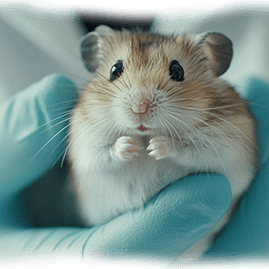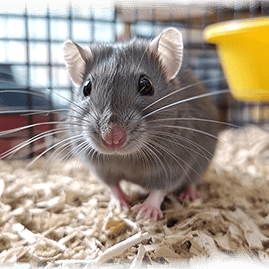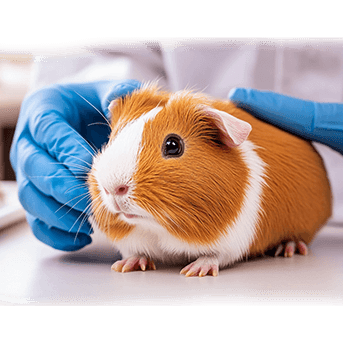Rabbit Health: Comprehensive Guide to Keeping Your Rabbit Happy and Healthy
Rabbits, like all pets, are prone to certain health problems. Being aware of these conditions and knowing how to address them will help you prevent serious complications.
Dental Problems
One of the most common health issues in rabbits is dental disease. Rabbits’ teeth grow continuously throughout their lives, so they need proper wear to prevent overgrowth.
- Signs of Dental Problems – Drooling, difficulty eating, weight loss, changes in eating habits, or a messy chin.
- Prevention – Provide a diet rich in hay, as chewing hay helps wear down the teeth naturally. Limit sugary treats and pellets.
- Treatment – If your rabbit shows signs of dental problems, take them to a vet for a dental exam. In severe cases, tooth trimming may be required.
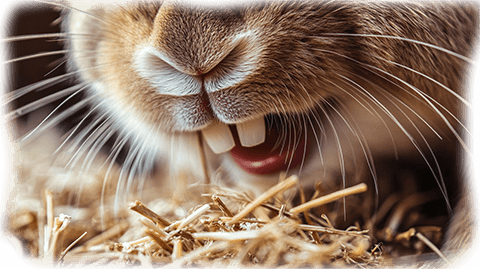
Gastrointestinal Stasis (GI Stasis)
GI Stasis is a serious and potentially life-threatening condition where the digestive system slows down or stops completely. This can happen if a rabbit isn’t eating enough fiber or if they experience stress.
- Signs of GI Stasis – Lack of appetite, small or no droppings, lethargy, a bloated stomach, or grinding teeth.
- Prevention – Ensure your rabbit has constant access to fresh hay, which is high in fiber and essential for proper digestion. Avoid sudden changes in diet, and minimize stress in their environment.
- Treatment – GI Stasis requires immediate veterinary attention. Your vet may prescribe fluids, pain relief, or other medications to stimulate the gut.
Respiratory Infections
Rabbits are susceptible to respiratory infections, commonly caused by bacteria such as Pasteurella multocida. These infections can spread quickly and may become chronic.
- Signs of Respiratory Infections – Sneezing, nasal discharge, labored breathing, or runny eyes.
- Prevention – Keep your rabbit’s environment clean and dry. Ensure their living area is well-ventilated but free from drafts. Avoid exposure to sick animals. (Amazon affiliate link)
- Treatment – Respiratory infections require veterinary treatment, often including antibiotics. Early intervention is key to preventing complications.
Flystrike
Flystrike occurs when flies lay eggs on a rabbit, and the hatched maggots burrow into the rabbit’s skin. This condition can be fatal if not caught early.
- Signs of Flystrike – Unusual behavior, lethargy, refusal to eat, or visible maggots on the rabbit.
- Prevention – Keep your rabbit’s living area clean and dry. Groom your rabbit regularly, especially around the rear end, to avoid urine or feces buildup that attracts flies.
- Treatment – Flystrike is a medical emergency. If you notice maggots, take your rabbit to the vet immediately for treatment.
Ear Mites
Ear mites can cause discomfort and lead to infections in rabbits. They are more common in rabbits with drooping ears but can affect all rabbits.
- Signs of Ear Mites – Excessive scratching at the ears, crusty skin inside the ears, or head shaking.
- Prevention – Check your rabbit’s ears regularly for any signs of mites or irritation.
- Treatment – Your vet can prescribe ear drops or other medications to treat mites.
Preventive Health Care for Rabbits
Regular preventive care is essential to keep your rabbit healthy. By maintaining a routine and addressing potential issues early, you can prevent many common rabbit health problems.
Balanced Diet
A proper diet is the cornerstone of a healthy rabbit. Rabbits require a diet that’s high in fiber and low in sugar.
- Hay – Provide unlimited access to fresh hay, which should make up the majority of their diet. Hay is vital for digestion and dental health.
- Fresh Vegetables – Offer a variety of leafy greens such as kale, parsley, and cilantro. Avoid giving too many sugary fruits.
- Pellets – Choose high-quality rabbit pellets but feed them in moderation—about a quarter cup per 5 pounds of body weight daily. (Amazon affiliate link)
- Water – Always provide fresh, clean water. Use a heavy ceramic bowl to prevent tipping, as some rabbits may prefer bowls over bottles.
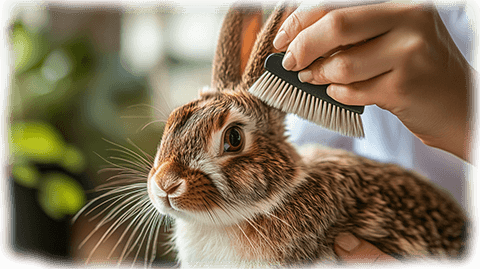
Grooming
Rabbits are self-groomers, but they need help with regular grooming to prevent matting and the ingestion of loose fur, which can lead to GI Stasis.
- Brushing – Brush your rabbit weekly, and more often during shedding season, to remove loose fur and prevent hairballs. (Amazon affiliate link)
- Nail Trimming – Trim your rabbit’s nails every 6-8 weeks. Overgrown nails can cause discomfort and injuries.
- Check for Skin Issues – Regularly check your rabbit’s skin for signs of mites, fleas, or wounds.
Housing and Environment
Your rabbit’s living environment plays a significant role in their health.
- Space – Provide ample space for your rabbit to hop, stretch, and exercise. A hutch or enclosure should be large enough for your rabbit to move around comfortably.
- Litter Box – Use a litter box with rabbit-safe litter (no clumping or scented types). Clean it regularly to prevent urine scald and reduce the risk of infections. (Amazon affiliate link)
- Toys and Enrichment – Provide toys to encourage mental stimulation and exercise. Chew toys, tunnels, and interactive items can help keep your rabbit happy.
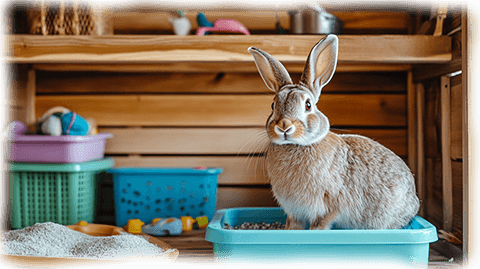
Veterinary Care
Regular check-ups with a rabbit-savvy vet are essential. Rabbits are prey animals, meaning they often hide signs of illness. Routine vet visits can help catch potential health issues early.
- Spaying/Neutering – Spaying or neutering your rabbit is crucial for preventing reproductive cancers and behavioral issues.
- Vaccinations – Depending on your location, your rabbit may need vaccinations to protect against diseases like Rabbit Hemorrhagic Disease Virus (RHDV).
Signs Your Rabbit Needs Veterinary Care
As prey animals, rabbits are experts at hiding illness, so it’s important to know the subtle signs that something might be wrong.
- Sudden lack of appetite or refusal to eat.
- Reduced or no droppings for 12 hours.
- Lethargy, hiding, or sitting hunched in a corner.
- Labored breathing or nasal discharge.
- Overgrown teeth or drooling.
If your rabbit displays any of these signs, seek veterinary care immediately. Early intervention can make a significant difference in their recovery.
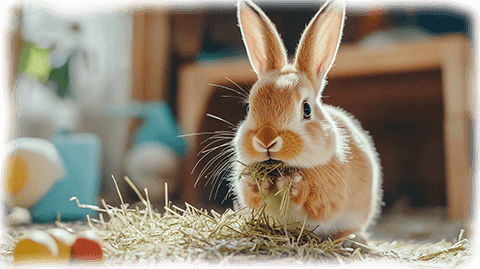
Helpful Tips for Rabbit Health Care
- Provide constant access to hay – It helps with both digestion and dental wear. (Amazon affiliate link)
- Monitor your rabbit’s droppings – Small, misshapen, or no droppings are signs of potential digestive issues.
- Keep the environment clean – Regularly clean their cage, litter box, and feeding areas to prevent infections.
- Handle your rabbit gently – Rabbits have delicate spines and can easily injure themselves if they struggle when picked up.
- Check your rabbit daily – A quick health check each day for signs of dental issues, overgrown nails, or changes in behavior can help prevent serious problems.
Conclusion
Caring for a rabbit’s health requires a combination of preventive care, proper diet, and regular monitoring. By staying on top of their grooming, dental health, and environment, you can help your rabbit lead a long, happy life. If you ever notice changes in your rabbit’s behavior or health, don’t hesitate to consult a vet—early treatment is key to addressing health issues before they become severe.
Further reading: Storey’s Guide to Raising Rabbits, 5th Edition: Breeds, Care, Housing by Bob Bennett. (Amazon affiliate link)
Affiliate Disclosure
This post may contain affiliate links, which means I earn from purchases made through links. Please see the privacy policy page for more details.


